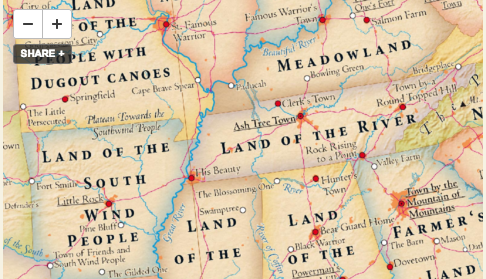I was born in the City of the Flowland People, made my way to Stink Onion upon reaching maturity, then onward to New Yew Tree Village where I have lived for the last 217 moons.
Look up some of your key co-ordinates in The Atlas of True Names and you too can have a personal history as mythic-sounding as mine. The maps—for the UK, USA, Canada, and World—replace modern geographical names with the original etymological roots of cities, countries, and bodies of water, translated into English. Their website picks the “Sahara desert” to illustrate the true name selection process. Their chosen label “The Tawny One” has its basis in es-sahra, translated from the Arabic as “the fawn colored desert”. It would be interesting to learn how many professional translators lent a hand with the etymological parsing. There are a lot of languages in this world and we all know the havoc Google Translate can wreak.
Married cartographers (and Lord of the Rings fans) Stephan Hormes and Silke Peust acknowledge that there could be alternates to their translations. This should come as a relief to the civic boosters of Philadelphia. Quibblers will no doubt enjoy taking issue with Hormes and Peust’s choices. Hopefully, any resulting internet brawls will take place on a higher—and dustier—plateau than those where vultures pick hapless celebrities to shreds.
Order one of these maps and pack it along on your summer road trip. Even if younger family members can’t be bothered to learn how to navigate without a phone, the narratively rich names are sure to leaven those long hours in the car. (How badly do you have to go, Jason? Can you hold out until Table or should Daddy pull over in the Valley of the Darkland Dweller?)
It’s living history in travel version.
Related Content:
Discover J.R.R. Tolkien’s Personal Book Cover Designs for The Lord of the Rings Trilogy
Download Eight Free Lectures on The Hobbit by “The Tolkien Professor,” Corey Olsen
Willie Nelson Auditions for The Hobbit Film Sequel, Turns 80 Today
Ayun Halliday is the author of seven books including the increasingly obsolete Zinester’s Guide to NYC and No Touch Monkey! and Other Travel Lessons Learned Too Late. Follow her @AyunHallliday



Stink Onions is a bad translations. Linguists are now saying Chicago was named for ramps, not onions.
Etymology, (OGr. etymon “true sense” and logos “speech, oration, discourse, word”) is the study of the origin and history of words. For the first time, the Atlas of True Names uses etymology to give us an unusual insight into familiar geographical names – with intriguing results.….. Once the names have been taken back to their roots and translated into English, it is immediately apparent that our world has an extraordinary affinity with Middle Earth, the mythical continent where the events of Tolkien’s ‘The Lord of the Rings’ are played out. Middle Earth’s evocative “Midgewater”, “Dead Marshes” and “Mount Doom” are strikingly similar in nature to Europe’s “Swirlwater”, “Darkford” or “Smoky Bay”, as revealed by the Atlas of True Names. Many geographical names are clearly rooted in Man’s observation of his natural environment; the physical location of a settlement: “At the Foot of the Mountain” – Piedmont, the character of an important water course: “The Gentle One” – The Seine or even just the local vegetation: “Under the Oaks” – Potsdam. Unsurprisingly, countries and landscapes often derive their names from the characteristics of the people who lived there: “Great Land of the Tattooed” – Great Britain, whilst local mythology and regional rulers also frequently leave their legacy: “Isle of the Monster’s Eye” – Peleponnese or “Illustrious Emperor” – Zaragoza. Sometimes, it is impossible to deny the force of the Roman proverb ‘nomen est omen’. For instance Grozny — the Chechnyan capital which, over the last years, has been destroyed in so many wars, – translates as “The Fearsome”. The Atlas of True Names restores an element of enchantment to the world we all think we know so well. It takes the reader on a journey into the unknown – a unique exploration of uncharted territory in that familiar place we all know as ‘home’. Take a look at the world through fresh eyes!